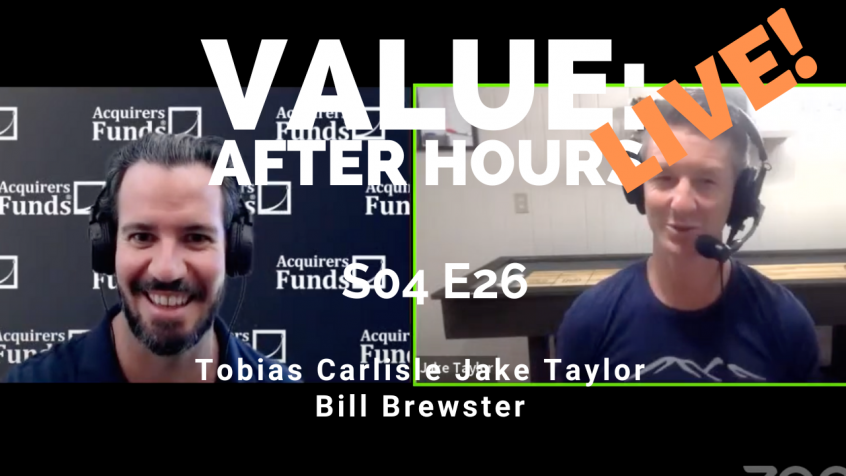In their latest episode of the VALUE: After Hours Podcast, Taylor, and Carlisle discussed Why Artificial Intelligence Will Never Beat the Stock Market. Here’s an excerpt from the episode:
Jake: This week we’re going to be talking about Learning Environment. We always touch on some of these subjects in the show, but I haven’t done a full treatment of it, yet, I don’t believe. A lot of it’s based on Robin Hogarth’s work, who is a researcher that studied different learning environments. And she separates them on a spectrum from kind to wicked. The thing to remember about it is that in kind learning environment, patterns recur, the situation is constrained, so think about like a chessboard, the pieces have knowable, movable options and they don’t deviate from those.
Every time feedback is quick, and obvious, and 100% accurate, and all the information is available. Like a chessboard, you’re looking, you could see all the pieces. On the one end, very extreme side, we have something like chess. Golf also falls within there, because it’s not like– Well, I have lost a fair number of balls, but theoretically, all the information is available where your ball went. But you get feedback readily as soon as you hit it, watching the flight path, all of that stuff.
Now, on the opposite end of the spectrum, we have the wicked environment, which is the exact opposite of all that stuff. Information is often hidden, feedback is delayed, it’s infrequent or even nonexistent. Wicked environments reinforce the wrong type of behaviors. You could think like, “All right, well, where does the investment world fall when it comes to kind versus wicked learning environments?” I think it’s pretty far on the wicked side, myself. Toby, what do you think?
Tobias: Yes, it’s wicked, for sure.
Jake: [laughs] Okay. I’m glad we’re in agreement. But Hogarth has this famous example that he talks about. There was this apparently, like very eminent, prominent physician. He came to prominence because he could accurately predict when someone would get typhoid weeks before they had any symptoms. He did this by somehow, like, palpitating their tongue with his bare hands.
Tobias: Like giving a typhoid?
Jake: It turned out was that he was actually giving them typhoid.
Tobias: [laughs]
Jake: [laughs]
Tobias: Sorry. I didn’t know that was actually going to be the answer.
Jake: No. Yeah, he’s learning the completely wrong lessons. Because he’s introducing a fair amount of error into the system. In chess, let’s go back to that as an example. It’s relatively easy to automate chess for a program to solve it, because it is so constrained and because the feedback loops are easier to be closed between what becomes a winning move or not. So, that’s how it could be automated, you can create programs. If you store enough data about different moves and where they lead to, you get this repeating patterns that happen.
I think that markets actually do have this. There are some repeating patterns that you can learn from and in businesses as well. There’s a lot of repeating patterns within businesses that I think the best investors recognize, and they see something that, and it rhymes with something else that they’ve either owned or studied, and that gives them some insight as to why it might be mispriced. But it’s not as clear to me that it’s as easy to figure out is something like chess, all which means, I would be surprised if AI was a thing that we really had to worry about in the investment world within our lifetimes. What do you think about that?
Tobias: [sighs] I think that the experience with poker and the experience with GO. GO is a more fluid game than traditional chess. And then poker, I think that AI has been trained to play heads up. So, it plays one on one. The problem was always that good professional poker players can deduce not facial tells, but they can look at the betting of the machine and they can start figuring out. Because the machine is just too literal. We had to teach the machine-
Jake: To be more sneaky.
Tobias: -to teach to bluff. But once they taught it to bluff, it became hard to beat. As a learning machine, I think that in heads-up poker, the best heads-up poker player is now a machine. And that happened a few years ago. I think the next step beyond that is playing with multiple players in a hand, which– I think that if anything that might be easier than heads up, it seems to be a problem to solve. I think it’s solvable. I think that machines could solve it, but doesn’t necessarily mean that it’s over for humans because you’re looking for the things that have become cheap. That’s the signal. That’s the sign that you’re looking for, right?
Jake: Yeah.
Tobias: So, you can still find those was my point.
Jake: Yeah. Right. I guess, the question would be, is there some reason to expect like the AI will get so much better at matching patterns that there’s no room left for human creativity?
Tobias: No, I don’t think so. I think that the best ones will always be, what are they call that Centaur?
Jake: Centaurs, yeah.
Tobias: Humans with chess machines. I think that’ll be that will be the best thing in the market. That’ll be something like a human with a computer helping make the decisions.
You can find out more about the VALUE: After Hours Podcast here – VALUE: After Hours Podcast. You can also listen to the podcast on your favorite podcast platforms here:
For all the latest news and podcasts, join our free newsletter here.
Don’t forget to check out our FREE Large Cap 1000 – Stock Screener, here at The Acquirer’s Multiple:



